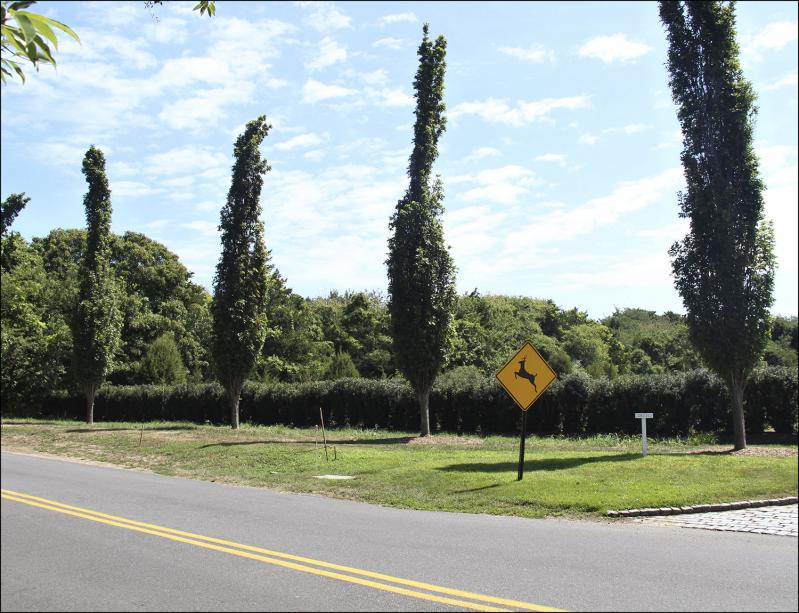The Town of East Hampton has a new lawsuit on its hands.
Last week, The Star reported about a hedge and trees that had been planted in an easement by the new owners of 370 and 372 Further Lane in Amagansett (their names thus far hidden by two limited liability companies, Further Lane EH, L.L.C. and Further Lane Barn, L.L.C.).
Turns out a group of six neighbors, who own adjacent and nearby properties, have had their eyes on the hedge since last March, when it was first planted. According to the “hybrid public nuisance action and petition” filed against the town and new owners, the hedge grew to its current stature of “three rows deep” in June.
That’s when the neighbors sent a letter to the town board and Jake Turner, the town attorney, letting them know that if they didn’t do something, they would be held liable. According to the lawsuit, that letter and over a dozen calls made to the Natural Resources Department, the town supervisor’s office, and the town attorney’s office, since March, have gone unanswered.
The properties were purchased together last winter for $70 million in one of the largest real estate transactions of the year.
The two parcels, however, are encumbered by four separate easements, including scenic and conservation easements, that were created in 1989, when they were first developed by Brian and Judith Little. The easements have been respected since.
In fact, the lawsuit states that the properties were “pristinely preserved by the prior owners, the Littles, for nearly 40 years.”
“Beyond the house itself, we want to do everything in our power to have the property look going into the future as it does now,” Mr. Little said at a zoning board of appeals hearing on the subdivision in 1987.
The lawsuit alleges that Mr. Turner told associates the matter was a “civil dispute” between neighbors and “not a concern of the town.”
One of the neighbors in the lawsuit, Jonathan Sobel, wrote the new owners multiple letters as well.
“Planting a row of trees along the east border has diminished 25 percent of the value of my property,” he wrote. “Having an open farm field view along a border in East Hampton is even less available than the coveted ocean views.”
The owner’s plantings have “completely obliterated and enshrouded what was once the public’s scenic view of many acres of open farm fields from Further Lane in Amagansett to the Atlantic Ocean’s dunes,” reads the lawsuit. The neighbors fault the town and planning board (which created the easements) for the “official lassitude” in “failing to enforce applicable easements and law as well as protect and restore the public’s scenic view in perpetuity.”
Lack of enforcement is a common complaint of residents throughout the town, whether it be for traffic violations, leaf-blower violations, clearing violations, building violations, you name it.
Apart from the hedge and trees, the lawsuit calls out “unauthorized structures” that have been added to the easement: a substantial irrigation system, white stone markers along the property lines, including in duneland, and tall poles strung with ropes. The neighbors further allege that to plant the huge hedge, native soils were removed from an agricultural overlay district, and new “fertilized soil” was introduced, another no-no.
“Despite petitioner’s requests, the owner had failed to respond to petitioner’s demands to cease and desist in the unauthorized plantings and structures; and, neither the town nor the planning board have undertaken to compel remediation or otherwise enforce the law,” reads the complaint.
With the lawsuit, the neighbors hope to declare the plantings a “public nuisance” and impose punitive damages on the new neighbors “for knowingly acting with intentional, reckless and wanton disregard to applicable law and the rights of the public.” They also want to stop any further plantings or structures and seek a finding that the town and planning board “failed in their duty” to prevent them in the first place.
Despite the acrimony, Mr. Sobel tried to use a touch of humor in his letters, perhaps to lighten the mood. “My experience here has been that some, unfortunately, advise clients to do what they’d like and worry about it later if you need to deal with it, often there’ll be no need,” he wrote. “A joke circulates among local counsel, ‘In a small town, a single lawyer can’t earn a living, but two can.’ “
Mr. Turner did not respond to a request for comment.




